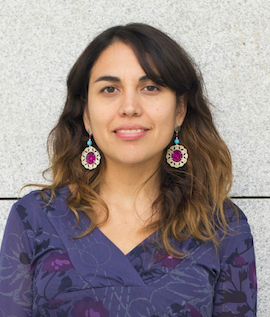Bárbara Poblete
Title: Mining knowledge from online social networks
Abstract:
The enormous rise in the generation of content on the Web, has made it increasingly important to automatically organize and understand this information. With the unprecedented success of online social network platforms, such as Facebook, Twitter and Flickr, users have changed their roles from being only information consumers, to also becoming editors and publishers. In particular, Twitter has become a preferred source for breaking news to an important percentage of Web users. The streaming nature of this platform, facilitates real-time information dissemination, before its publication in traditional mass media. Moreover, not only objective facts regarding news are spread through social media, but also multiple opinions and points of view. Therefore, social media activity surrounding news events provides rich insight into human perception of world events. Nevertheless, the rapid flow of large data volumes in Twitter makes information volatile, producing the loss of potentially important historical data for users and for society in general as well. Following this motivation, in this talk I will discuss some examples of how social knowledge can be extracted from microblog content, such as, credibility prediction, event detection, and the analysis of cultural differences between countries. I will present our current work in the direction of understanding events in social media as complex units of information, using sentiment, visualization and geo-temporal context.
Bio:
Barbara Poblete is an Assistant Professor at the University of Chile. She received her Engineering and M.Sc. from the University of Chile in Santiago, Chile and her Ph.D. from the University Pompeu Fabra in Barcelona, Spain. She worked as a Researcher at Yahoo Labs and later joined the University of Chile where she holds her current position. Barbara is head of the PRISMA research group at the Computer Science Department of the University of Chile. She is also an Young Researcher in the Nucleo Milenio of Semantic Web Research. Barbara’s research interests are in the areas of Big Data, in particular in Web data mining, Online Social Network analysis and information retrieval on the Web. Her work on time-sensitive credibility in microblog platforms, published at The World Wide Web Conference and in the journal Internet Research, has been recognized by important news media, such as Scientific American Magazine, The Wall Street Journal, Slate Magazine, The Huffington Post among others. Her Google Scholar profile shows over a thousand citations to her research since 2011. Currently, she serves in the Program Committee of the conferences SIGIR, ECIR, WSDM, CIKM and is reviewer for several journals in her field. In addition, she is one of the organizers in the annual Celebration of Women in Computing in Chile.
Jean Honorio
Title:
Learning Structure from Data: Applications, Algorithms, Statistical Efficiency and General Frameworks
Abstract:
In machine learning, many inference problems require a known structure which is unobserved in the real world. This structure is usually expressed as a graphical model which provides a way to represent entities along with their dependencies. Structure learning refers to the problem of learning the topology (and parameters) of the graphical model from observed data. My research in this area focus on developing computationally and statistically efficient algorithms, understanding their behavior using concepts such as convergence and sample complexity, and designing new modeling paradigms such as models rooted in game theory.
This talk will first focus on the problem of learning probabilistic and game-theoretical structures from data. Motivated by these goals, this talk introduces recent techniques for the approximate optimization of a discontinuous and NP-hard objective function, as well as convergence rates for a class of objective functions for which only biased estimates of the gradient are available. On the applied side, we will discuss issues of interpretability and regularization, and show interesting findings in political science (U.S. congressional voting records), neuroscience (cocaine addiction) and genetics (cancer).
The above learning problems are instances of a more general problem: regularized loss minimization (RLM). Understanding the behavior of this general problem is of great importance, given that RLM is a common approach to solving many machine learning problems. This talk introduces novel results of loss consistency, norm consistency, sparsistency and sign consistency for RLM. These results pertain to several problems in the literature, such as the estimation of exponential family distributions (e.g. learning the graph structure of Gaussian or discrete MRFs), generalized linear models (e.g. linear regression, compressed sensing), matrix factorization problems (e.g. exponential-family PCA, max-margin matrix factorization), nonparametric linear regression (with an infinite set of basis functions), nonparametric clustering with exponential families (where the number of clusters is not fixed and possibly infinite), PAC-Bayes learning (e.g. classification, structured prediction) as well as several regularization techniques.
Bio:
Jean Honorio is an assistant professor in the Computer Science department at Purdue University. He was a postdoctoral associate at MIT CSAIL from 2012 to 2015, working with Tommi Jaakkola. He received his PhD in Computer Science from Stony Brook University in 2012. His research focuses on developing computationally and statistically efficient algorithms for high dimensional problems (big data), and designing new modeling paradigms such as models rooted in game theory. His theoretical and algorithmic work is directly motivated by, and contributes to, applications in political science, neuroscience and genetics.
Awais Khan
Title: Integrated Analysis of Omics Data to Address Questions of Biological Significance
Abstract: In recent years, the huge amount of biological data generated by great advances in genome sequencing, genomics, transcriptomics, metabolomics and phenomics have proven to be a significant bottleneck. Integrated analysis of data from different platforms is needed to understand the functioning of complex systems, through dissecting each component and their interactions, as well as the responses to various biotic and abiotic stimuli. However, current algorithms and applications in bioinformatics are not sufficient in terms of processing throughput and precision to handle high throughput omic and imaging data, so new ways of thinking about the data and how best to handle it are needed. This presentation will discuss potential options for computer vision and pattern recognition to accelerate discovery of genes, pathways and to solve questions of biological significance.
Bio:
Dr. Awais Khan is an abiotic stress geneticist for potatoes and sweet potatoes, leading the efforts to uncover the genetic basis of adaptation and abiotic stress tolerance, for potatoes and sweet potatoes at International Potato Center (CIP). His research background is in population and quantitative genetics, comparative genomics and bioinformatics, with wide experience of genetic and genomic tools and techniques. He is particularly interested in making use of current advances in genome sequencing and bioinformatics to address issues of maintaining crop productivity under worsening climate conditions.
Originally from Azad Kashmir, Pakistan, Dr. Khan earned an M.Sc. in Plant Breeding and Genetics/Tropical & International Agriculture at the Georg-August University Göttingen, Germany, in 2003, with a focus on using biochemical and molecular markers to study the genetic diversity in safflower. He then completed his PhD at the Swiss Federal Institute of Technology (ETH) in Zurich, Switzerland, in 2007, where he identified genomic regions linked to fire blight resistance in apples. Next, he worked as a postdoctoral researcher in the Department of Biology, University of York, UK on the genetic control of artemisinin (an anti-malarial drug), related metabolites, and biomass traits in Artemisia annua. Before moving to CIP, Dr. Khan was at the University of Illinois, Urbana-Champaign, USA where he used genomics, quantitative and population genetics, and bioinformatics to elucidate the genetic control of fruit quality and disease resistance in apples. He has presented in international conferences and published in high impact scientific journals such as Science and Genome Research, a total of more than 40 peer-reviewed articles. Dr. Khan has also given lectures and tutorials on genomics and quantitative genetics worldwide.
Denis Parra

Title: The Recommendation Problem: From the Netflix Prize to Interactive User Interfaces
The vast amount of information available online in the form of Web Pages, Online Social Networks and Mobile Applications provides a great resource to help us stay informed and make decisions, but it also forces us to deal with information overload. Under this scenario, Recommender Systems become and essential tool by providing personalized suggestions to our information needs, to help us choose our favorite products or to find the most appropriate content for our learning outcomes. The research in this area is sometimes framed within the so called “recommendation problem”, which has grown from off-line rating prediction and top-N ranking algorithms to more user-centric research of online systems which help users understand why a recommendation was done, providing users with explanations and control over the recommendation process.
In this talk, Prof. Parra will briefly introduce the most important algorithms used to develop recommender systems, and then he will present his research in the area (tag-based recommendation, implicit feedback, time-aware methods, HCI) with a special focus on interactive interfaces for recommender systems. He will present results of a recent research project on the cross-roads of Data Mining, Music Recommendation, Affective Computing and HCI for providing mood-aware music recommendations within a novel exploratory interface.
Bio:
Denis Parra is Assistant Professor at the School of Computer Science in the Pontifical Catholic University of Chile. He holds a BS in Informatics from Universidad Austral de Chile and a PhD in Information Science from the University of Pittsburgh, PA, USA. His main interests are Recommender Systems, Information Visualization and Social Networks. He currently teaches Data Mining in the Master Program in Information Processing at PUC and Recommender Systems at the Master Program in Computer Science at the same university. During the last years, he has published in several journals and conferences, such as the International Journal of Human-Computer Studies (IJHCS) and Computer Communications (ComCom), the ACM conferences in Intelligent User Interfaces (IUI), Hypertext and Social Media, WWW, RecSys and UMAP. As an expert in Recommender Systems, he was recently invited to give a keynote on Recommender Systems at the Chilean Computer Science week for newcomer researchers. Denis is also de winner of best paper awards and nominations, at conferences like UMAP and ACM Hypertext. He has been local chair of the ACM Hypertext Conference 2014 and has co-organized the latest two versions of the Social Personalization and Search workshop (SPS) at Hypertext and SIGIR conferences. Professor Parra also leads the Social Computing and Visualization Group (SocVis) at PUC, http://socialcomputing.ing.puc.cl/



